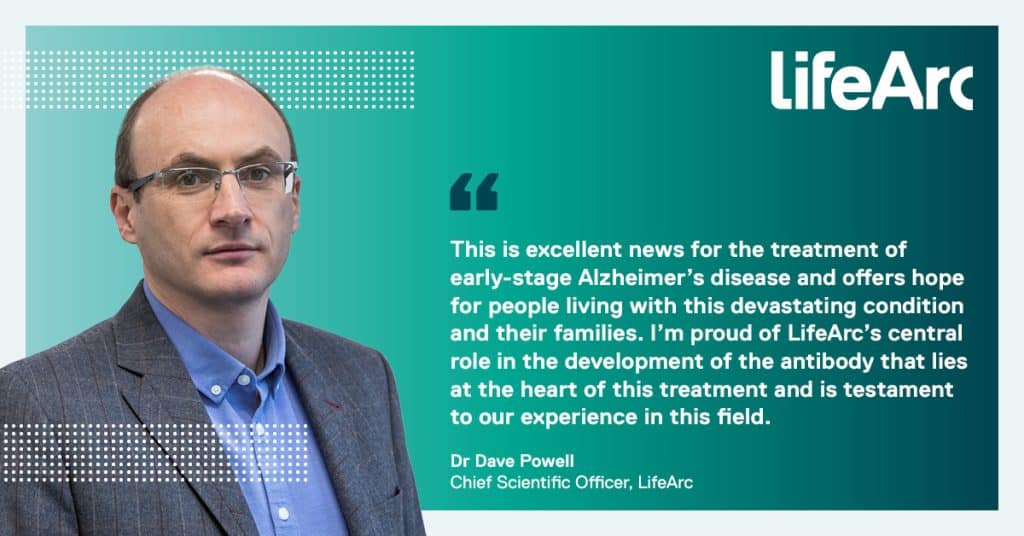The therapeutic antibody lecanemab (LeqembiTM) has received full market approval by the US Food and Drug Administration (FDA) for use in the United States. It is with great satisfaction that we can make this announcement due to the instrumental role LifeArc played in the drug’s development through our antibody humanisation work.
LifeArc’s key role
Alzheimer’s disease – the most common type of dementia – affects more than half a million people in the UK. It is a progressive brain disorder that slowly and irreversibly destroys memory, thinking and language skills in those affected by it. Until now, there were no effective treatments to prevent, slow down or reverse the disease.
It is believed that a root cause of Alzheimer’s lies in the toxic form of a protein called amyloid beta, which builds up in the brains of people affected by the disease in deposits known as amyloid plaques. In response, LifeArc scientists partnered with the biotechnology company BioArctic Neuroscience to humanise mAb158, a monoclonal antibody derived from mice which targets a specific form of the amyloid beta protein. This antibody humanisation involves replacing the mouse regions of the antibody with human sequences until only the most critical parts remaining are of mouse origin – reducing the likelihood of triggering an immune response in the patient. The result was the generation of a new, humanised antibody for clinical use – lecanemab.
A subsequent trial, involving around 1,800 patients with early-stage Alzheimer’s disease, revealed that the cognitive capabilities of people who received treatment with lecanemab declined by 27% less than those on the placebo after 18 months.
While these effects are fairly modest, the extraordinary implications of this historic moment cannot be overstated – the first treatment that’s ever been proven to slow the progression of dementia.
Celebrating the importance of our work
We’re proud to have performed such a significant role in the development of such a promising new therapeutic antibody. In particular, it is noteworthy that the humanised antibody sequence used in the treatment is exactly the same as the version that left our laboratory after the initial humanisation stage – a demonstration of our experience in this area.
LifeArc has successfully humanised more than 90 therapeutic antibodies, including four that are now approved treatments and four in clinical trials, and this news serves as a reminder of the valuable benefits for patients that can be attained from our translational work.

Of lecanemab’s recent approval, Dr Dave Powell, Chief Scientific Officer at LifeArc, said: “This is excellent news for the treatment of early-stage Alzheimer’s disease and offers hope for people living with this devastating condition and their families. I’m proud of LifeArc’s central role in the development of the antibody that lies at the heart of this treatment and is testament to our experience in this field.
“This is the first drug to show a clinical benefit for people living with this form of Alzheimer’s and we hope the UK regulator will make a quick decision so eligible people in the UK can also benefit from this new medicine.”
The results are a clear example of how our experience and hard work can pay off in the most impactful of ways. Through LifeArc’s efforts, and now that lecanemab has received official approval, an effective treatment option can at long last be provided for people with early signs of dementia – offering hope to millions of patients and their families around the world.
Media contact
Hannah Severyn
Head of Media and PR at LifeArc



